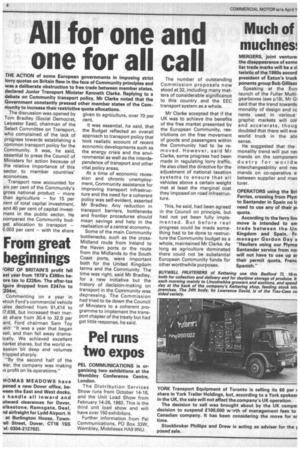All for one and one for all call
Page 6

If you've noticed an error in this article please click here to report it so we can fix it.
THE ACTION of some European governments in imposing strict lorry quotas on Britain flew in the face of Community principles and was a deliberate obstruction to free trade between member states, declared Junior Transport Minister Kenneth Clarke. Replying to a debate on Community transport policy, Mr Clarke noted that the Government constantly pressed other member states of the Community to increase their restrictive quota allocations.
The discussion was opened by Tom Bradley (Social Democrat, Leicester East), chairman of the Select Committee on Transport, who complained of the lack of progress towards establishing a common transport policy for the Community. It was, he said, essential to press the Council of Ministers for action because of the relative importance of this sector to member countries' economies.
Transport now accounted for six per cent of the Community's gross national product — more than agriculture — for 15 per cent of total capital investment, and 40 per cent of capital investment in the public sector. He compared the Community budget allocation to transport — 0.003 per cent — with the share given to agriculture, over 70 per cent.
It was essential, he said, that the Budget reflected an overall approach to transport policy that took realistic account of recent economic developments such as the energy crisis and the environmental as well as the interdependence of transport and other vital policy areas.
At a time of economic recession and chronic unemployment, Community assistance for improving transport infrastructure and the need for a coherent policy was self-evident, asserted Mr Bradley. Any reduction in transport barriers, bottlenecks and frontier procedures should mean savings and help in the realisation of a central economy.
Some of the main Community bottlenecks, such as the crossMidland route from Ireland to the Haven ports or the route from the Midlands to the South Coast ports, were important both for the United Kingdom terms and the Community. The time was right, said Mr Bradley, for a new initiative but the history of decision-making on transport in the Community was depressing. The Commission had tried to tie down the Council of Ministers to a coherent programme to implement the transport chapter of the treaty but had got little response, he said. The number of outstanding Commission proposals now stood at 32, including many matters of considerable significance to this country and the EEC transport system as a whole.
Mr Clarke accepted that if the UK was to achieve the benefits of the free market presented by the European Community, restrictions on the free movement of goods and passengers within the Community had to be removed. However, said Mr Clarke, some progress had been made in regulating lorry traffic. He also cited the directive for the adjustment of national taxation systems to ensure that all vehicles above a certain weight met at least the marginal cost they imposed on road infrastructure.
This, he said, had been agreed in the Council on principle, but had not yet been fully implemented. But before real progress could be made something had to be done to restructure the Community budget as a whole, maintained Mr Clarke. As long as agriculture dominated there could not be substantial European Community funds for other worthwhile purposes.




















































































